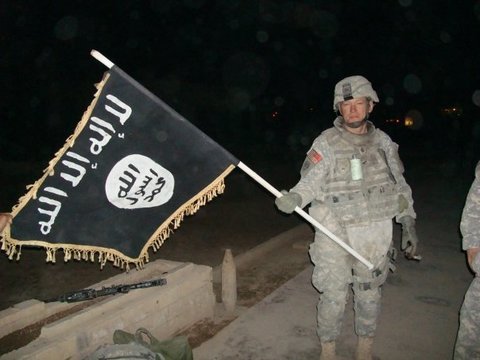The Latest—and Perhaps Last—Twist in Doe v. Mattis
The Doe v. Mattis saga has taken a significant turn, as the U.S. government continues to attempt to rid itself of the dual U.S.-Saudi citizen it has held in military custody in Iraq since last September (following his capture in Syria by the Syrian Democratic Forces): In a filing late this afternoon in the D.C.

The Doe v. Mattis saga has taken a significant turn, as the U.S. government continues to attempt to rid itself of the dual U.S.-Saudi citizen it has held in military custody in Iraq since last September (following his capture in Syria by the Syrian Democratic Forces): In a filing late this afternoon in the D.C. federal district court, the government announced that it intends to “release” Doe within 72 hours, dropping him in or near a town in Syria that apparently is identified in an accompanying, sealed declaration. The ACLU, which represents Doe, has denounced the proposal as “a death warrant,” according to the Washington Post’s Spencer Hsu. “They want to dump an American citizen onto the side of the road in a war-torn country without any assurances of protection and no identification.” Presumably, the ACLU will shortly seek some kind of emergency relief (most likely a preliminary injunction) against the government’s proposed disposition.
We’ve followed this litigation closely from the start, including near-weekly coverage on the National Security Law Podcast. Once briefing on this new development begins, we will have much more to say both there and here. In the meantime, we write tonight to offer some initial observations.
First, this question is not going to be resolved in the next 72 hours. As noted above, the ACLU has already indicated that it will challenge the government’s proposal on the ground that it would be tantamount to a “death warrant”—releasing Doe into a war zone in circumstances in which he would be in very serious jeopardy. There are lots of implicit suggestions in old Supreme Court cases that courts have the power to condition a detainee’s release to avoid such a circumstance, but whether those circumstances are present (and whether this is an appropriate case for the exercise of such judicial discretion given that Doe voluntarily traveled into the same war zone) will surely provoke extended litigation.
Second, there could also be litigation over whether the “release” is, in fact, a thinly disguised transfer to some group’s custody in Syria. That would bring us back to the question that a divided panel of the D.C. Circuit resolved in Doe’s favor in May with respect to the government’s proposal to transfer Doe to one of two classified countries (that were almost certainly Saudi Arabia and Iraq), i.e., whether the government would need affirmative legal authority to transfer a U.S. citizen under those circumstances. Alternatively, assuming a genuine release—but one still involving involuntary cross-border transfer—there could be litigation regarding whether that scenario too implicates the Valentine rule.
Third, we note that this proposal emerges just two weeks before the next major hearing in the district court on the underlying merits of Doe’s military detention (whether the government has a sufficient actual and legal basis to justify his detention under the 2001 authorization for the use of military force) was supposed to take place. We do not think it at all likely that this new issue will be resolved before then, and so the question surely will arise: Should there be yet another delay in the district court’s resolution of the merits of Doe’s detention, in order to see how this latest twist plays out? The two of us have disagreed (and still disagree) over Doe’s likelihood of success on the merits. But the one point on which we have agreed for months is that it is long-past time for the district court to reach those merits, one way or the other. Whatever happens in Doe’s case going forward, the idea that the government could hold an American citizen in military detention for over nine months without even a preliminary judicial ruling as to the legality of that detention is one that we should all find discomfiting.
Fourth, and related, it is striking to both of us that the government appears increasingly inclined to avoid those merits—and to prevent the federal courts from weighing in on the merits of Doe’s detention (and the much bigger, and more important, question of whether the 2001 AUMF encompasses the Islamic State, which no court has yet resolved). Whether that’s a reflection of the government’s assessment of its chances of prevailing or not, it is certainly curious. We also continue to find it striking that there is no further talk of a federal prosecution option notwithstanding the strong basis for a material support prosecution that appears on the face of the government’s earlier filings in this case.
All of this is just to say that this latest development may well be the beginning of the end of the Doe v. Mattis legal saga. But there’s likely going to be a lot of interesting (and time-consuming) litigation between here and there.




.jpg?sfvrsn=d5e57b75_7)

